Orbán's good cop, who crosses doctors and teachers but pardons a terrorist
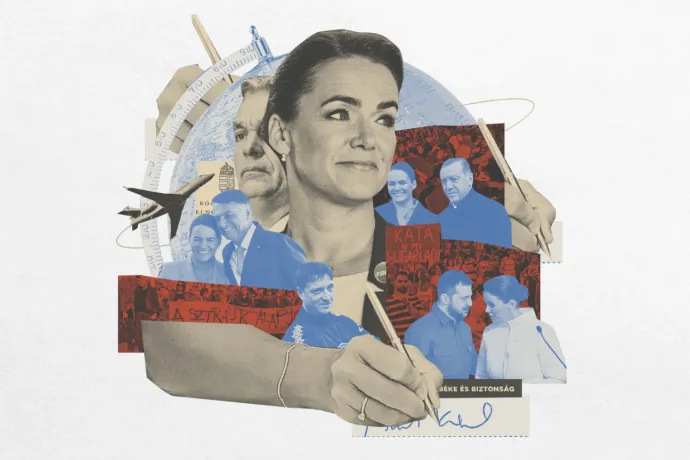
It's been exactly one year since Katalin Novák took office. The former Fidesz Minister for Family Affairs promised that as president she would act as the ears, heart and mouth of the people, and that she would only sign good laws. But a year after her inauguration, it appears that she likes to sign the laws that Viktor Orbán and his party adopt, and doesn't listen to the voices of the protesters. She outperforms her predecessor János Áder in two ways: she grants pardons more often and travels much more than he did. On her foreign trips she tries to show the more cordial side of Hungarian diplomacy in the role of the good cop assigned to her. She likes to appear approachable, but never goes completely against the government's official position. Such was Katalin Novák's first year as head of state.
"Those who say I will be a puppet in this office are not actually underestimating me, but women. They do not suppose that a woman can be a sovereign public figure capable of making independent decisions." These were the words that launched Katalin Novák's career as head of state after she was catapulted from the front ranks of Fidesz to the Presidential Palace, the seat representing the nation's unity.
Novák became Hungary's new president exactly one year ago, on 10 May, when she received the keys from her stone-faced predecessor, János Áder. Aged 44 at the time, she became the country's youngest ever head of state and the first woman to hold the position as well.
At the same time, Novák ditched her two well-known pairs of earrings: one with the initials of Prime Minister Viktor Orbán's name and the other with the word "Fidesz" inscribed on it, and promised to do what the law requires her to do anyway: to watch over the democratic functioning of the state: "There are many, many fault lines within a family, a small community and our nation as a whole that we must overcome. It is my task to find the height where our nation has a self-evident unity. It is not only my duty mandated by the Constitution, but also my own personal commitment (...) The first thing that comes to mind is that it will be difficult. Although it will be a difficult task, I am convinced that it is not impossible," she said. The year that has passed since her inauguration has shown that she likes to appear approachable, but never goes completely against the government's official position.
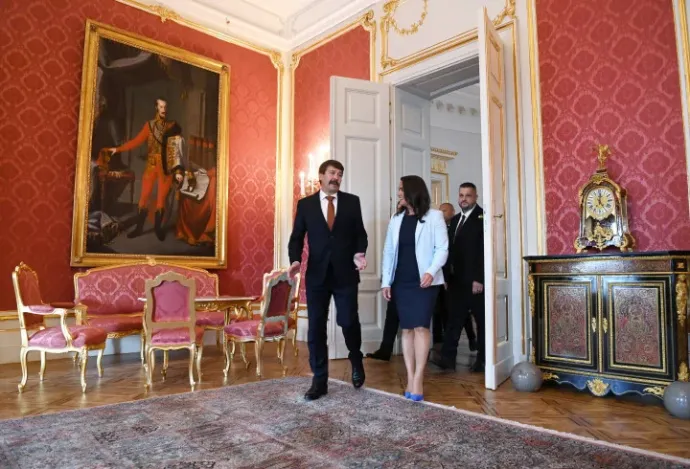
When she wasn't an ear and a mouth
From the very beginning, Novák spoke of wanting to be "an ear, a heart and a mouth for those we currently see, hear and understand less", and gave her word that if she received a hundred good laws, she would sign a hundred, and if she received a hundred bad ones she would send the same number back to Parliament. It seems that almost without exception, Parliament only sent good laws during her first year, because she signed almost everything that was placed before her.
The governing parties, for example, practically executed the tax form previously used by most small business owners (called KATA) within two days, which meant that hundreds of thousands of taxpayers had to switch to other, more complicated and expensive forms of taxation or close down their businesses as of September last year. Although Novak "sensed" the outcry, she was unfazed by the violent protests and bridge closures: as President of the Republic, she signed the law a few days after its adoption. Afterwards, she explained on Facebook that war = economic crisis = need for a firm hand, and that it was "right in this situation for the head of state not to put obstacles in the way of the National Assembly's decision".
She also had no problems signing the law that gutted the Hungarian Medical Chamber (MOK), stripping it of some of its rights and abolishing compulsory membership. The Fidesz majority in parliament voted for this after the MOK had protested against the overhaul of the on-call doctor system and asked the government to consult the medical profession on its health reform plans.
Novák didn't find anything wrong with the law making it impossible for teachers to strike either, even though it restricts Hungarian educators' right to strike. Although the teachers' unions sent her a letter asking her not to sign the law, they said the signing had happened so quickly that their letter had probably not even reached the Presidential Palace by then.
She also signed the 11th amendment to the "granite-solid" Fundamental Law, including the renaming of counties and county leaders to their archaic names, (LINK) as well as the new – and for opposition parties particularly unpleasant – provision that from now on European parliamentary and municipal elections will be held simultaneously. Novák did so with the stability of the Constitution in mind.
Only a single law didn't pass through her sieve in the past year: she did not sign the new Complaints Act, which was thus sent back to Parliament for consideration. The law, which has already been adopted by the National Assembly regulates, among other things, how to submit an anonymous complaint if one witnesses corruption, but it also includes a section on how to file a complaint with state and local authorities against those who challenge the constitutionally recognised role of marriage and family or the "right to protection and care necessary for the proper physical, mental and moral development of children and to a self-identity appropriate to their sex at birth".
Novák justified the rejection of the law by arguing that its instruments were “debatable as they could serve to increase mistrust among members of the community". And although the head of state can refer a law back to Parliament, if it is passed a second time in the same way, without changes, there is nothing to be done, Novák will have to sign it.
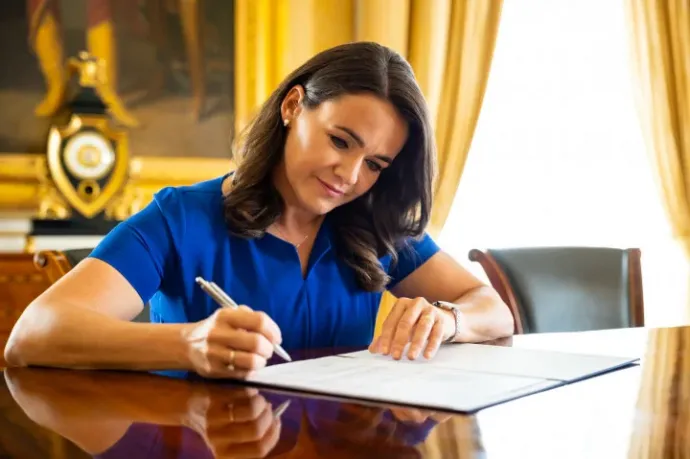
The good cop
When Novák is not busy signing a law, she is conspicuously active in foreign affairs. According to Radio Free Europe's tally, her predecessor János Áder only traveled abroad eight times over a similar period in his first five years in office, while Novák has already visited 25 countries and attended 59 diplomatic events during her first nine months as president.
This included such meetings as a cordial visit to President Jair Bolsonaro in Brazil, who once made a comment about a Brazilian congresswoman that it wouldn't be worth raping her because she was ugly. In any case, Novák said of the meeting that "together with President Bolsonaro, we are ambassadors of peace" and that Brazil is a world champion in football while Hungary is a world champion in supporting families.
She also went to Turkey, where she met with President Recep Tayyip Erdoğan who has used increasingly authoritarian means to build his rule over the last two decades. This has included various ways of repeating local elections when he didn't like the results, jailing opposition politicians or rendering some parties running at the elections impossible.
Since her inauguration, Novák has traveled extensively, meeting with high-level foreign leaders. Her first trip was to Poland – a symbolic move, since by then the Polish and Hungarian governments were no longer as friendly as before because of Viktor Orbán's Russia-friendly policies. She also had one-to-one meetings with Czech Prime Minister Petr Fiala, Latvian President Egils Levits, Slovenian Prime Minister Robert Golob and Romanian President Klaus Iohannis, but she visited Germany, Portugal, the Vatican, Canada, Croatia, Kosovo, France, Israel, Iraq, Malta, Serbia, the United Kingdom and the United States as well.
So what we are seeing at the moment is a double game where, while Prime Minister Viktor Orbán and Foreign Minister Péter Szijjártó often criticise states allied with Hungary or Ukraine, and Szijjártó regularly travels to Moscow, Novák prefers to play the role of the good cop.
One of the most important examples of this was when Novák visited Ukrainian President Volodymyr Zelensky in Kyiv. Orbán hasn't been to Ukraine since the outbreak of the war, and it doesn't seem likely he would be going any time soon either. And while the Hungarian government tries to appear neutral in the Russian-Ukrainian conflict by repeatedly chanting the words peace and ceasefire, in fact it often leans more towards the Russian side. Novák, on the other hand, has been a little more specific than the government in her pro-Western messages, as her inaugural speech also showed. Moreover, she clearly condemned Putin's aggression in Ukraine.
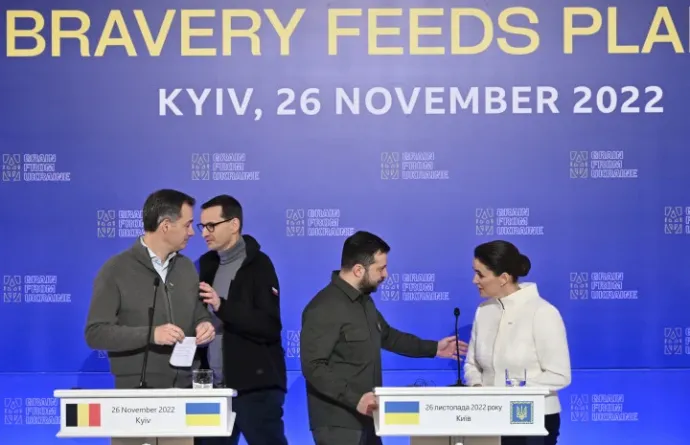
She recently went as far as declaring that “the peace plan needed is one which doesn’t include the victory of Russia, but at the same time sets out realistic objectives”, and she also spoke about the need for Russia’s withdrawal of its troops from Ukraine.
In spite of this, she is careful not to cross a certain boundary, and to never go directly against the government’s official stance on a matter – for example, she has never said that Hungary should provide Ukraine with weapons. With all of this, the Orbán government is sending the message that there is someone here, in a high position, who represents the softer, more cordial, approachable side of Hungarian diplomacy. Not to mention the fact that she is a woman, and Novák often speaks from a woman’s or a mother’s perspective, as if to say that she is aiming to achieve something via dialogue instead of a show of strength.
It’s not only on matters of war and foreign diplomacy that Novák has clearly tried to present herself as a middle-groun president. She also played the good cop when the governing parties kept dilly-dallying about the vote on the NATO accession of Sweden and Finland – the Finns’ accession was finally approved after 8 months, but they are still making the Swedes wait, as Fidesz is still expecting “some assurances” from them. To be safe, Novák made it clear in a Facebook post that she needs no such things: “my stance is obvious: in the current situation, the NATO accession of both Sweden and Finland is justified” – she wrote.
She is also playing the approachability card when sharing her Christmas Spotify list with her social media followers, or sits down for an interview with papers she wasn’t willing to sit down with when she was Fidesz’ Minister for Family Affairs, or when she opens up the Presidential Palace for a whole weekend (on the occasion of the first anniversary of her inauguration, the building is open to visitors this weekend again).
A generous dispensation of clemency
Of course, the lives of the heads of state aren't all smooth sailing either, they're only human, and they sometimes do divisive things. Novák, for example, went to Romania last year, where a Facebook post of hers about representing all Hungarians led to a minor confrontation with the Romanian Foreign Ministry. The Hungarian Head of State wrote that for her there was no difference in terms of representation of Hungarians living inside or outside Hungary's borders, to which the Romanian Foreign Ministry responded that Novák's statement did not comply with international law, as no state can formulate any rights in relation to citizens of other states.
She also didn’t completely shed her role as Minister for Family Affairs: she spoke to Pope Francis in Budapest about the family being the basis of survival for a nation. And in an interview, she called it her personal mission to tell young women that it is not worth giving up having children just because someone loves their job and wants to be fulfilled in their vocation. She then subtly moved on to the government's assertion which they love repeating, namely that "we must reject the destructive ideology which aims to break up traditional families". This is nothing new under the sun, since back in the day Novák argued that the Covid-19 pandemic was the reason for amending the country’s Fundamental Law by adding the statement that the mother is a woman and the father is a man.
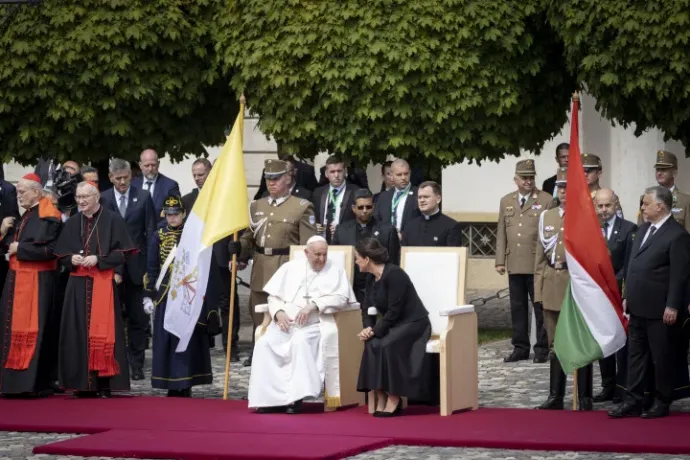
Her most divisive act came at the end of her first year in office: she granted a presidential pardon to György Budaházy, who had been convicted of terrorism. The founder of the Hunnia Movement was sentenced to a definitive 6-year prison term for acts the likes of which hadn’t been seen before in the history of modern Hungary. Budaházy and his team had carried out Molotov cocktail attacks on SZDSZ and MSZP party offices, two gay bars and a ticket office. There were coordinated arson attacks against six members of parliament, several Molotov cocktails were thrown at the under-construction summer home of Minister János Kóka, they shot at the house of former Education Minister István Hiller, and a series of bomb attacks were intended to interfere in politics and prevent the election of the successor to the resigned Prime Minister Ferenc Gyurcsány. The result: Budaházy left Vác prison on horseback, and declared it a great and brave thing that Novák had done this.
Novák is a generous pardon-giver anyway: according to 2022 figures, she approved eleven of the 194 executive pardons – only Árpád Göncz approved more than she did. She also approved seven procedural pardons granted to defendants who have not yet received a final conviction – by comparison, Áder didn't approve any during his presidency.
It's roomier inside
After a tiring day, Novák can relax in her presidential residence on Béla Király Road, which was renovated for almost 280 million forints. She can watch a film in the cinema room in the basement, while sipping wine from the cooler in the built-in oak cabinet. She may also choose to retreat to the smaller make-up room or the soundproofed music room.
In addition to her official duties, she also tries to keep active in her spare time: Novák decided to complete the National Blue Trail (the longest continuous hiking trail that spans across Hungary) during her five-year term. She will be accompanied on this journey by her husband, the country's first First Gentleman, who recently became a Lieutenant Colonel in the Army Reserves after only five weeks of training.
It is already certain that Novák will have no financial problems for the rest of her life, as the President of the Republic is entitled to a special allowance under the law. Like her predecessors, she will receive a monthly salary of several million forints for the rest of her life, and if she were to so request, she will be provided with a residence and a single staff member even after her mandate expires and she has to hand over the property on Béla Király Road to her successor. The head of state will also have the use of a personal car, a three-person secretariat and free medical care for the rest of her life.
For more quick, accurate and impartial news from and about Hungary, subscribe to the Telex English newsletter!